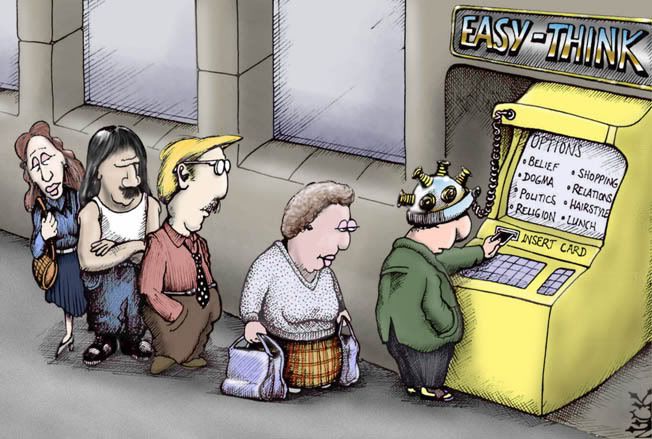Debord's idea of commodity as spectacle is both metaphysical
and physical. It's not only about the products that one buys but also the ideas
that people buy into. Debord uses this idea to show how the "social
elites", capitalist government, and big businesses control the very
thought process of their commodities which are their consumers. We are the
"spectacle" as we allow ourselves to be brainwashed into wanting and
needing new products. It becomes an image and social group that we want to be a
part of and be associated with.
"Whereas in the primitive phase of
capitalist accumulation, "political economy sees in the proletarian only the worker" who must receive the minimum indispensable
for the conservation of his labor power, without ever seeing him "in his
leisure and humanity," these ideas of the ruling class are reversed as
soon as the production of commodities reaches a level of abundance which
requires a surplus of collaboration from the worker. This worker, suddenly
redeemed from the total contempt which is clearly shown him by all the
varieties of organization and supervision of production, finds himself every
day, outside of production and in the guise of a consumer, seemingly treated as
an adult, with zealous politeness." (43)
This idea presented by Debord plays
well against modern American government and economics. With a teetering job
market, the value of money becomes more than it's worth. The concept that
"money makes the world go round" rings true for every person within
the American working-class. However, even with money scarce the consumer world
that is American society never sleeps or goes into hibernation. The idea of
saving is never in a person's mentality. Newer generations must have the newest
products in order to fit in and older generations must have products that make
their lives easier. It is a vicious circle that feeds the economy and makes the
economic world go round.
This cartoon by New Zealand cartoonist Nick Kim sums up
everything Debord writes in the second chapter of his book. Commodity is not
any specific item or product; it is this concept of thought. With the average
worker putting in hours to make money for the survival of his or her family, ease
of access becomes the best thing any working class citizen can think about.
"Effortless Thinking" as Nick Kim puts it, is the commodity that
Debord had in mind. After a hard day's work, the government and/or the corporations
tell the worker how to spend his or her leisure time. It's this idea that
crowds malls on Black Friday and this idea that has people buying something
every single day of their lives.
In his book 1984, George Orwell had this idea that
the government sees all and controls all. In this day and age it is not the
government that we necessarily have to worry about, rather it is the big
businesses and corporations that see all and control all.

In this cartoon by POLITICO'S Matt Wuerker, it is clearly depicted as to how corporations
control the economy and the lives of most citizens. Workers are in a sense
"brainwashed" into believing that they need a new product every time
it comes out. They are encouraged to spend their hard earned money. While this
does help the economy the lives of workers and other lower class consumers are jeopardized
when the lack of money becomes a problem. Between this idea that one must have
the latest "iPhone" versus the lack of funds to pay for it, the consumers
lose themselves and become a commodity for the social elites. In the end it is
their pockets that are lined with money while ours wear thin.
Commodity as spectacle can mean many
things to many different people. The social elites can see it as one thing
while the working class or "proletarian", as Debord puts it, can see
it as another. In the end it is simply all a matter of perspective. However, in
today's American society commodity is not just the "iPhone" but also
the person buying it. The minds of people are easily controlled by flashy objects
and farfetched reasoning. That is what the spectacle is, the idea that one will
spend money they don't have to buy something they do not need.

No comments:
Post a Comment